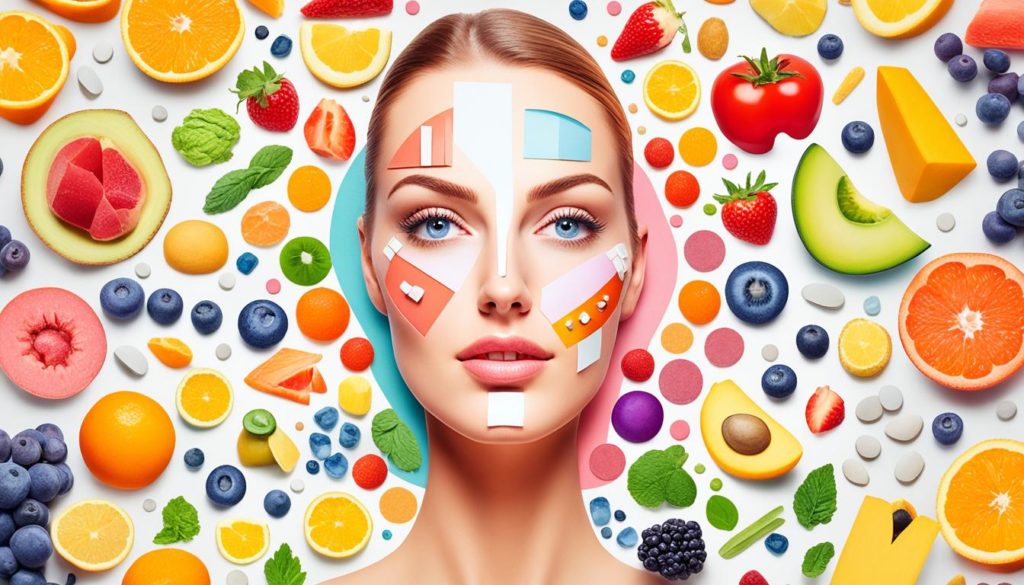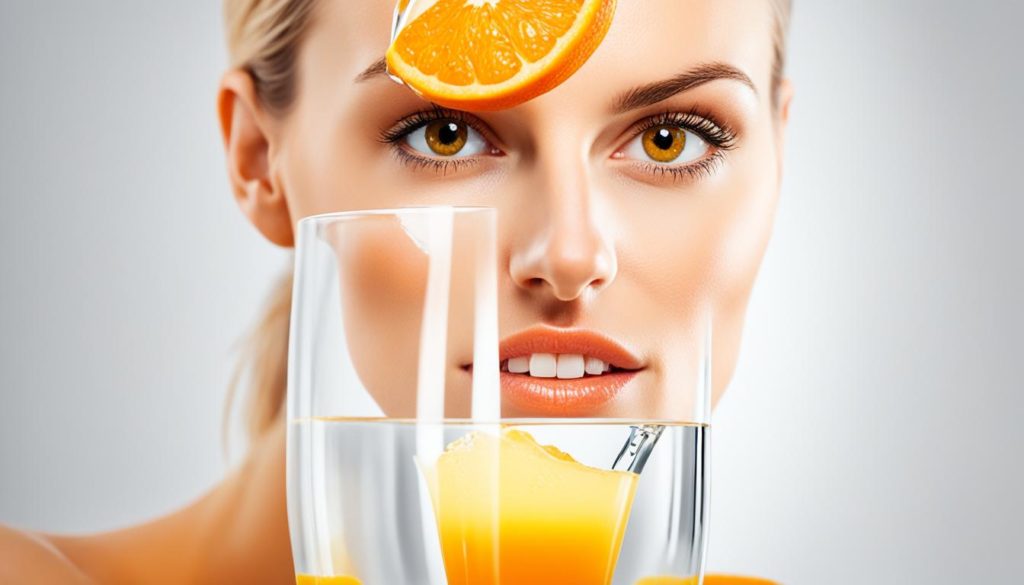Each year, over 50 million Americans battle with acne. It’s the top skin issue in the U.S. Many people try creams and medicines yet often miss a powerful solution: vitamins. Studies show that certain vitamins can greatly boost skin health from within. In this piece, we’ll dive into how vitamins impact skin and fight acne, aiming for a glowing look naturally.
Key Takeaways
- Over 50 million Americans suffer from acne annually.
- Clear skin vitamins can significantly improve skin health.
- Natural vitamins for acne provide an inside-out approach to clearer skin.
- Specific vitamins play key roles in skin health and acne prevention.
- Understanding the role of vitamins helps in effective acne treatment.
The Role of Vitamins in Skin Health
Vitamins are key to keeping skin healthy, affecting skin cell renewal and protection. Knowing how they work with the skin helps us understand their effects on acne.

Understanding Skin Physiology
The skin needs many nutrients to stay healthy as it’s our largest organ. Vitamins aid in creating collagen, maintaining the skin barrier, and fighting oxidative stress. Lack of vitamins can weaken the skin barrier, letting in infections and inflammation which might appear as acne.
How Vitamins Impact Acne
Research links certain vitamins to acne severity. Vitamin A, for example, helps to stop dead skin cells from clogging pores. B vitamins like Niacinamide can reduce oil and lessen acne breakouts.
Vitamin shortages may tie to more severe acne. Not enough Vitamins D and E can raise inflammation and hurt immune responses, worsening acne. Adding the right vitamins to your diet or skincare can improve skin health and fight acne.
Vitamin A for Acne: The Retinol Revolution
Vitamin A is famous for its power against acne. It’s known for retinol, which helps achieve clear skin. It tackles persistent acne well. Let’s look into how it works, where to find it, and choose between creams and pills for the best effect.

Benefits of Vitamin A
Vitamin A has many acne-fighting benefits. It reduces inflammation and makes skin cells renew faster. This helps prevent acne. Retinol, a type of vitamin A, also unclogs pores and makes skin smoother. This makes vitamin A a strong ally in preventing and fighting acne.
Sources of Vitamin A
You can get vitamin A from various foods, making it easy to add to your diet. Animal foods like liver and dairy have a lot of it. Plants like carrots and greens give you vitamin A too. This helps you get enough vitamin A to manage acne.
Topical vs. Oral Vitamin A
Choosing between creams and pills for vitamin A depends on your skin and acne. Creams work right where you need them, with fewer body-wide effects. They help with acne and make skin look better. Pills are used for tough acne but need a doctor’s watch because of side effects.
Each choice has benefits for treating acne. The best option depends on your skin, how bad your acne is, and your health. Always talk to a doctor to find what’s best for you.
Vitamin C for Acne: Antioxidant Power
Vitamin C is key in antioxidant skincare and is great for skin health. It fights acne by reducing inflammation and boosting collagen. This makes vitamin C an essential part of skincare.
Reducing Inflammation and Redness
Vitamin C reduces inflammation by fighting free radicals. This means less redness and swelling from acne. Using vitamin C can lead to clearer skin with fewer blemishes.
Boosting Collagen Production
Collagen keeps our skin strong and elastic. Vitamin C helps make collagen, which is critical for skin repair. Skin becomes more resilient and smooth thanks to vitamin C.
Vitamin C-rich Foods
Eating foods rich in vitamin C is crucial for skin health. These foods boost the effects of topical vitamin C treatments. Here are some top choices:
- Oranges
- Strawberries
- Kiwi
- Bell Peppers
- Broccoli
- Spinach
Adding these foods to your diet enhances the benefits of vitamin C skin treatments. Combining diet and topical applications offers a strong skincare routine. This leads to healthier, clearer skin.
Vitamin E for Acne Scars: Healing and Repair
Vitamin E is well-known for its healing powers. It’s great for acne scars. It’s a top skin repair vitamin. It really helps improve your skin’s look and feel.
Anti-inflammatory Properties
Vitamin E is great for acne scars because it fights inflammation. It’s packed with antioxidants. These antioxidants reduce skin inflammation. This helps stop new acne from forming. It also promotes skin healing. Vitamin E cools down irritated skin, making it feel better.
Repairing Skin Tissue
Vitamin E helps fix damaged skin cells. It makes skin cells grow back healthier. This is key to smoothing out scars. Tests show it works, making skin look better and scars less visible.
Topical Application of Vitamin E
To really benefit from vitamin E, put it directly on your scars. Use oils, serums, or creams with vitamin E. These products pack a strong vitamin E punch. This means your skin heals faster. With regular use, scars can fade and skin looks fresh and healthy.
Vitamin B Complex: Complete Skin Support
B complex vitamins are key for healthy skin. They include important ones like niacinamide and biotin. These help control skin functions and fight common problems like acne.
Niacinamide is great for managing oil, while biotin boosts skin health. We will explore B vitamins’ role in hormonal balance and the role of supplements and diet.
Niacinamide for Oil Control
Niacinamide, a B vitamin, can reduce oil production. This is good news for those with oily skin. It helps prevent clogged pores and pimples.
Adding niacinamide to your skin care can improve skin texture and clarity. This makes your skin look better.
Biotin and Skin Health
Biotin is also crucial in the B complex for skin health. It helps create new, healthy skin cells. It’s useful for fixing dry or flaky skin.
Getting enough biotin, through food or supplements, makes your skin smoother and more hydrated.
B Vitamins and Hormonal Balance
B vitamins, like B6 and B12, help keep hormones in check. Hormones often cause acne in adults. B vitamins support brain chemicals and lower stress.
This can prevent acne related to hormone shifts.
Supplements and Diet
To get more B vitamins, you can eat certain foods or take supplements. Opt for whole grains, eggs, nuts, and leafy greens.They are all rich in B vitamins.
People with special needs might find B complex supplements helpful.
| Food Source | Niacinamide Content | Biotin Content | Overall B Vitamins |
|---|---|---|---|
| Whole Grains | High | Moderate | High |
| Eggs | Moderate | High | Moderate |
| Leafy Greens | Moderate | Low | High |
| Nuts | Moderate | Moderate | Moderate |
Vitamin D and Acne: The Sunshine Vitamin’s Impact
Understanding how vitamin D and acne are linked is key for clear skin. Dubbed the “sunshine vitamin,” it boosts the immune system and fights inflammation.
Immune System Support
Vitamin D strengthens your immune system, crucial for fighting acne. It helps make vitamins that protect against infections worsening acne. A strong immune system keeps acne-causing bacteria at bay, reducing breakouts.
Reducing Inflammation
Inflammation plays a big role in acne. Vitamin D can cut down inflammation, making breakouts less severe and frequent. Adequate vitamin D levels help control the skin’s inflammation, offering relief for inflammatory acne sufferers.
Natural Sources of Vitamin D
Knowing where to get vitamin D is essential for fighting acne. Sunlight is best, but food sources matter too:
- Fatty Fish: Such as salmon, mackerel, and sardines, are full of vitamin D.
- Dairy Products: Milk and cheese, when fortified, offer vitamin D.
- Egg Yolks: Easy to find in many meals, are a good source.
- Mushrooms: Like maitake and portobello, especially if UV light has hit them.
Adding these foods to your meals boosts vitamin D, improving skin health and fighting acne. Mix sun exposure with these foods for a full acne care strategy through immune support.
Minerals Complementing Vitamin Acne Solutions
Vitamins can help with acne, but adding specific minerals boosts their power. Minerals like zinc and selenium play key roles in fighting acne. They make vitamin treatments even better.
Zinc for Acne Prevention
Zinc for acne is a strong anti-inflammatory. It lowers the production of substances that cause skin inflammation. Research shows zinc cuts down acne by controlling inflammation and oil in the skin.
Selenium’s Role in Skin Health
Selenium supplements boost skin care by protecting against cell damage. It acts as an antioxidant and strengthens the immune system. This is great for fighting acne caused by bacteria. Adding selenium helps shield the skin further.
Combining Vitamins and Minerals
Vitamins and minerals work better together for acne care. This vitamin-mineral synergy means they enhance each other’s effects. It offers a complete solution for healthier skin.
| Mineral | Role in Skin Health | Key Vitamins to Combine |
|---|---|---|
| Zinc | Reduces inflammation, controls oil production | Vitamin A, Vitamin C |
| Selenium | Acts as an antioxidant, supports immune function | Vitamin E, Vitamin C |
Top Nutrient-Rich Diets for Clear Skin
Maintaining clear skin goes beyond what you put on it. It also depends on your diet. Nutrient-rich diets can greatly improve your skin health. They help in preventing and treating acne. Diets like the Mediterranean, vegan, and ketogenic bring unique benefits.
Mediterranean Diet
This diet is filled with fruits, veggies, whole grains, and healthy fats. It’s known for reducing inflammation and making skin more hydrated. It’s packed with antioxidants, omega-3 fatty acids, and vitamins. These protect the skin by fighting oxidative stress and helping cells repair themselves.
Vegan and Plant-based Diets
Vegan and plant-based diets are great for the skin. They’re rich in vitamins, minerals, and antioxidants. Focusing on fruits, vegetables, nuts, seeds, and legumes helps. This diet is good for plant-based skincare. It has lots of fiber which helps detox your body. Plus, the essential nutrients aid in skin repair and making it look fresh.
Keto for Skin Health
The keto diet is not just for losing weight. It also helps your skin. Cutting carbs and eating more healthy fats can balance insulin. This can reduce acne. Keto foods are full of omega-3 and omega-6 fats. These reduce inflammation and help clear your skin.
Adding these nutrient-rich diets to your life can greatly improve your skin. Choosing the right foods is key to taking care of your skin.
The Link Between Vitamin Deficiency and Acne
Understanding how lacking certain vitamins affects acne is key for clearer skin. It’s important to know which deficiencies might lead to breakouts. Learning how to spot these deficiencies is also crucial. Finally, it’s good to figure out how to deal with them through diet and supplements.
Common Deficiencies Leading to Acne
Several nutritional deficiencies can lead to acne. Vitamins A, D, and E play a big role in skin health. Not having enough of these vitamins can hurt the skin’s repair and defense systems. This can make acne worse. Also, missing out on some B vitamins and zinc can trigger breakouts.
How to Identify Nutritional Gaps
Finding nutritional gaps takes several steps. Blood tests can show if you’re missing any vitamins. They help see what you’re not getting enough of in your diet. A doctor can help make sense of these tests. They can help create a plan to fix any deficiencies. Knowing signs of vitamin deficiencies, like feeling tired, dry skin, or slow healing, is also helpful.
Supplementation vs. Natural Intake
It’s important to weigh the pros of vitamin supplements against getting vitamins from food. Supplements can quickly fix shortages. But getting vitamins from food offers wider benefits. Eat foods rich in vitamins like leafy greens for A, citrus for C, and fatty fish for D. Eating a varied diet helps your overall health and keeps nutrient levels up. Supplements can be a helpful extra when needed.
“Achieving optimal skin health often requires a balanced approach, incorporating both supplements and nutrient-rich foods,” advises dermatologist Dr. Julie Harper.
Choosing the Best Vitamin Supplements for Acne
Finding the right vitamin supplements for acne is important. You’ll need to look at the quality of the supplements. Also, be aware of any side effects to make sure the treatment is safe and works well.
Quality and Efficacy
How well vitamin supplements work for acne depends on their quality. A good quality supplement comes from strict manufacturing standards and tests for purity. It also has ingredients proven to help with acne.
- Purity Testing: Ensures that the supplement is free from harmful contaminants.
- Clinically Proven Ingredients: Indicates research-backed efficacy for acne treatment.
Potential Side Effects
Even the best products can have side effects. Knowing about them helps you avoid problems. If you keep an eye on how you react, you can adjust the dosage as needed. This helps make sure the supplements help your skin without causing issues.
- Gastrointestinal disturbances
- Allergic reactions
- Interactions with other medications
Consulting Healthcare Professionals
Always talk to a healthcare professional before starting any new vitamins for acne. They can offer advice that is just right for you. With their help, you can choose supplements that are safe and get you closer to your skincare goals.
| Aspect | Importance |
|---|---|
| Supplement Quality | Ensures purity and efficacy |
| Potential Side Effects | Prevents adverse reactions |
| Professional Consultation | Personalized and safe regimens |
Conclusion
Vitamins and minerals play a key role in getting and keeping clear, healthy skin. This article has shown how certain vitamins like A, C, E, B complex, and D help skin health. They offer benefits like reducing inflammation and supporting hormonal balance. Using these clear skin vitamins is crucial for an effective acne solution. It shows the value of adding these nutrients to your skincare routine.
Minerals like zinc and selenium also help improve skin health and fight acne. Whether you get these through food or supplements depends on your personal needs and a doctor’s advice. A balanced approach to skincare is important. Consider the quality and effects of products, possible side effects, and professional guidance.
There’s also evidence linking Vitamin D levels with skin conditions. Research indicates that enough Vitamin D can help control inflammatory responses in skin issues like acne and psoriasis. For detailed info, see this study. Eating a diet rich in essential nutrients and knowing about vitamin deficiencies can help you care for your skin better.
FAQ
Can vitamins really help in clearing acne-prone skin?
Absolutely, vitamins are key in keeping skin healthy and fighting acne. Vitamins like A, C, and E are great for easing inflammation, helping skin heal, and keeping it healthy.
What are the best vitamins for acne-prone skin?
The top vitamins for acne-prone skin are Vitamin A, C, and E. Vitamin B complex, including Niacinamide and Biotin, are also helpful. Plus, Vitamin D, Zinc, and Selenium can make a difference too.
How does Vitamin A help with acne?
Vitamin A regulates how skin cells are made and lowers the chance of pores getting clogged. It also helps in getting rid of old skin cells. This stops dead cell pile-up that can lead to acne. Retinoids, from Vitamin A, are often used on the skin to treat acne.
Can Vitamin C reduce acne redness and inflammation?
Yes, Vitamin C is a strong antioxidant that decreases inflammation and redness from acne. It boosts collagen production, helping skin heal and repair faster.
What role does Vitamin E play in healing acne scars?
Vitamin E has anti-inflammatory and antioxidant effects that aid in skin repair and regeneration. Using Vitamin E on the skin can help lessen acne scar visibility over time.
How do Vitamin B complex vitamins support skin health?
Vitamin B complex, particularly Niacinamide (B3) and Biotin (B7), supports skin by controlling oil, improving skin’s barrier, and balancing hormones. These can all impact acne.
What are some of the natural sources of these vitamins?
You can find these vitamins in foods like:
– Vitamin A in carrots, sweet potatoes, spinach
– Vitamin C in citrus fruits, bell peppers, strawberries
– Vitamin E in almonds, sunflower seeds, avocados
– B vitamins in whole grains, eggs, almonds
– Vitamin D in fish, fortified dairy, sunlight exposure
– Zinc in oysters, red meat, pumpkin seeds
– Selenium in Brazil nuts, fish, eggs
Can vitamin deficiency lead to acne?
Yes, not getting enough of certain vitamins, like Vitamin A, D, and B vitamins, can increase your risk of acne. Having a balanced vitamin intake is crucial for clear skin.
What should I consider when choosing vitamin supplements for acne?
In picking vitamin supplements for acne, look at the product’s quality and effectiveness, and know the possible side effects. Consulting a healthcare professional to customize supplements to your needs is smart too.
Should I opt for supplementation or natural intake of vitamins?
Getting vitamins from food is ideal, but supplements can help with deficiencies or for specific treatments. Mixing diet and supplements is often best for good results.
How do minerals like Zinc and Selenium complement vitamin acne solutions?
Minerals like Zinc and Selenium support skin health. Zinc reduces inflammation and acne-causing bacteria. Selenium’s antioxidant properties help in skin repair. Together with vitamins, they improve skin health.


